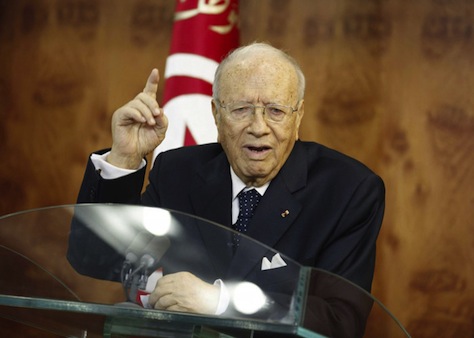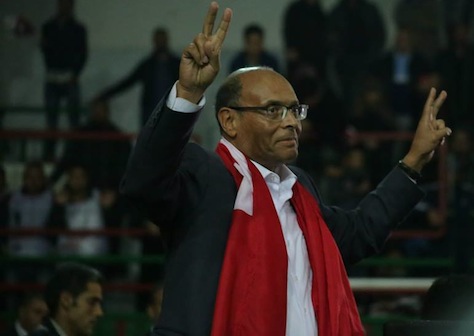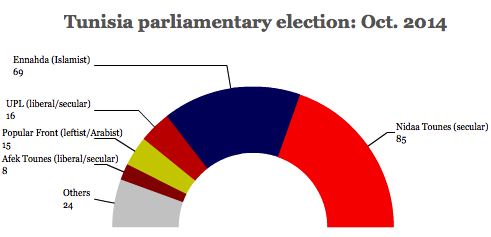Longtime secular political figure Beji Caid Essebsi won Tunisia’s presidency in Sunday’s landmark elections, representing in many ways the culmination of the country’s progress from the Arab Spring protests that ended with the ouster of Zine El Abidine Ben Ali in January 2011.![]()
Despite the optimism that marked Ben Ali’s fall and the promulgation of a new constitution in January 2014, Essebsi (pictured above), a figure with ties to the old Ben Ali regime — will face the same fundamental problem that both Ben Ali and the interim governments of the past four years faced in bringing about greater economic growth and creating new jobs for an underemployed youth population.
* * * * *
RELATED: Tunisian election results: the (secular) empire strikes back
RELATED: How Tunisia became the success story of the Arab Spring
* * * * *
By any stretch, Tunisia is clearly the success story of the Arab Spring — though it faces its own set of struggles in the years ahead, it hasn’t fallen into Libya’s chaos, reverted to Egypt’s military-backed authoritarian rule or fallen into a Syria-style civil war. When Tunisia held its first parliamentary elections under its new constitution in October, and when the Essebsi’s secular Nidaa Tounes (حركة نداء تونس, Call of Tunisia) narrowly defeated Tunisia’s Islamist party Ennahda (حركة النهضة), Tunisia’s Islamists gracefully conceded. Unlike in Egypt, where the Muslim Brotherhood broke its pledge not to run a presidential candidate in the 2012 election, Ennadha wisely chose not to contest the presidential fight, which culminated in a runoff between Essebsi and Moncef Marzouki, a human rights activist and secular liberal who has served as Tunisia’s interim president since 2011.
Marzouki (pictured above), who lost by a double-digit margin of 55.68% to 44.32%, according to official results released Monday, congratulated Essebsi earlier Tuesday, clearing the way for a peaceful transfer of power. Though Marzouki still commands significant respect within the country, he has struggled to tamp down increasing disenchantment with the economy and sporadic episodes of violence. Though not an Islamist himself, Marzouki won the presidency through Ennahda‘s support, and many of its voters preferred Marzouki over Essebsi, given the latter’s ties to prior regimes that often repressed religious expression.
While Tunisia can take some pride in the strides that it has made, the best way for its political elite to secure the political gains of the past four years is to boost economic growth and pull Tunisia firmly into the class of rising middle-income countries through economic reform, public sector modernization and closer ties with the European Union. In that regard, Essebsi’s task is not incredibly different than any number of new leaders in post-revolutionary countries on the European periphery, from the democratic (Ukraine’s Petro Poroshenko) to the autocratic (Egypt’s Abdel Fattah El-Sisi). But with GDP growth of barely 3% last year, a 15% unemployment rate and a jobless rate of around 30% for young Tunisians, the relative success or failure of the Essebsi administration will lie in its ability to foster growth, and that was always going to be true of the next government — liberal, Islamist or otherwise.
The lack of economic opportunity has already caused at least 3,000 young Tunisians to join the jihadist Islamic State group (الدولة الإسلامية)
Marzouki lost Sunday’s election in large part due to his inability to effect that kind of economic turnaround. There’s some doubt that Essebsi, at age 88, and with links to the elite that ran the country for decades even before Ben Ali, is the man for the job. Essebsi once served as an adviser to Habib Bourguiba, Tunisia’s president for 30 years after independence and Ben Ali’s mentor until Ben Ali ousted him in the 1987 coup.
Nevertheless, Tunisia is well placed for success if Essebsi and his incoming team are genuinely committed to the task. It has closer ties to Europe than any other country in north Africa, and it could easily leverage its relationships with France and Italy, in particular, into ever greater economic partnership. The European Union’s new foreign policy chief Federica Mogherini, formerly Italy’s foreign minister, has long championed greater cooperation with Tunisia. Mogherini, who faces the task of coordinating foreign policy for 28 disparate member-states, needs to craft policy victories within the new office of high representative for foreign affairs and security policy, which came into existence only in 2009 as a result of the Treaty of Lisbon. Facilitating Tunisia’s economic transformation could give Mogherini and the European Union a huge success on the world stage.
Essebsi could also reduce the amount of corruption in Tunisia, which was ranked 79th worldwide in the 2014 Transparency International Corruption Perceptions Index. Though the interim government begrudgingly, under pressure from the International Monetary Fund, reduced fuel subsidies, there’s still room to slash further wasteful subsidies to farmers and other interest groups, while liberalizing labor laws and other economic regulations. With a public debt of around just 50% of GDP, Tunisia cannot continue to run budget deficits that are expected to exceed 6% to 8% of GDP for 2014 and at least 5% of GDP in 2015. If Essebsi can redirect some of the budget away from subsidies, kickbacks and other wasteful spending and into education, job training and other stimulative measures, he could improve Tunisia’s fiscal situation while maintaining or even improving public investment.
That depends on Essebsi and if he is willing or able to embody the spirit of genuine reform. Initially, Essebsi will benefit from Nidaa Tounes‘s plurality in the new Tunisian parliament, but he will also be forced to work with opposition parties, including even Ennahda.


